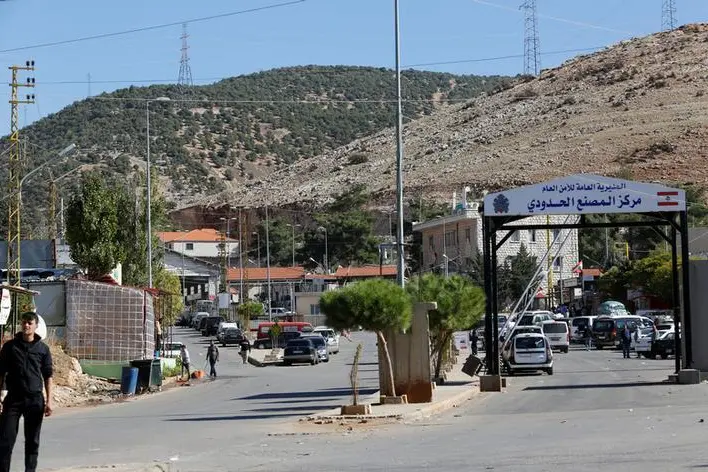PHOTO
BEIRUT: Lebanon is seeking to negotiate its northern maritime border with Syria, after reports that Syria has pressed ahead and granted a Russian oil and gas company rights to explore an offshore zone of the east Mediterranean Sea, resurfacing the decade old dispute.
The contract between Damascus and Moscow, signed off on March 16, authorizes a Russian company, Capital Limited, to explore, develop and produce petroleum in a 2,250 square kilometer zone off the Syrian coast for a period of 25 years.
But around 33 percent of that zone, approximately 750 square kilometers, is within what Lebanon claims to be its own exclusive economic zone (EEZ).
Syrian media reported last month that President Bashar Assad had signed a deal for exploration in Block 1 of Syrias exclusive economic zone, off the coast of the port city of Tartus, which extends south to the Syrian-Lebanese maritime border and overlaps significantly with Lebanons own maritime areas designated for energy exploration.
An official contract has been signed between the Syrian government and a Russian company, Middle East oil and gas governance expert Laury Haytayan told to The Daily Star.
There is a company that has signed a contract on Block 1, the Syrian Block 1, that is overlapping with Block 1 and 2 from the Lebanese side, she said.
For both countries, the potential economic boon of the unexplored waters is great. According to a US Geological Survey from March 2010, there is an estimated 1.7 billion barrels of recoverable oil and 122 trillion cubic feet of recoverable gas unexplored in the Levant Basin, which at the time were the worlds largest gas finds in decades.
Despite this, Lebanon and Syria have never officially demarcated their land or sea border.
Since 2010, both countries have been at odds over their respective EEZs. At the time, according to Haytayan, the Lebanese Energy Ministry, along with the president and prime ministers offices, was working to engage with Syria over the maritime delimitation lines, but it never resulted in formal talks.
In 2011, Lebanons president and Cabinet inked the delineation of Lebanons southern, western, and northern EEZ with the UN, under Decree No. 6433.
Since then, Lebanons Energy Ministry launched various attempts to begin offshore exploration in their Block 1, by opening up bidding rounds for drilling companies to win the rights.
But every time this happened, Syria filed complaints with Lebanon and the UN, contesting the demarcation line and citing that the coordinates sent to the UN in 2011 were never agreed on.
For Syrias part, their demarcation line uses latitudes as a methodology to state their offshore zones, but without an official EEZ or negotiations with Lebanon, Haytayan said, and that Syria cannot unilaterally decide that this is their border.
The latest move by Syria, that signed a 48-month exploratory contract for the Russian group to carry out seismic surveys and minor drilling, has jolted Lebanese politicians into action once again, and comes just when officials have been focused on the more sensitive southern maritime border dispute with Israel.
Haytayan believes now is the time for the government to open talks with Syria, which would be less complicated than with Israel, because we do recognize each other [as countries].
Moreover, the contract between Syria and Russia formally acknowledges the disputed territory with Lebanon in writing, which Lebanese officials should take as encouraging sign, Haytayan said.
The Syrians are recognizing there is a problem, so Lebanon shouldnt shy away from communicating with the Syrians about this development and asking them to come to the table."
After the news broke, President Michel Aoun called Assad and discussed the issue with him, official sources said. Aoun then decided to hand the file over to the team from the Lebanese Army responsible for negotiations with Israel over the southern maritime border dispute, but nothing has yet been officially publicized.
Caretaker Foreign Minister Charbel Wehbe said in an interview earlier this month with MTV: We must now negotiate with our Syrian brothers within the logic of international law, good neighborliness and the fraternal relationship between the Arab countries to demarcate the maritime borders.
He also revealed that he was in contact with the Syrian ambassador to Lebanon, and that the move by Syria was not an aggression, adding that he sought to find the correct moment to begin talks with Syria.
His comments stood in contrast to other politicians who have voiced concern over the infringement.
Future Movement MP Rola Tabsh spoke candidly after hearing the news of the signed deal between Syria and Russia: Where do the official Lebanese authorities stand on this issue?
We waited for the violation from the south, from the enemy (Israel), but it came from the north, from a brotherly country.
Similarly, head of Lebanese Forces Samir Geagea called on the president and caretaker prime minister to assign a law firm to send an ultimatum to the Russian company and inform it that the Syrian bloc is interfering with the Lebanese borders and this constitutes an encroachment on our land.
He added, If Assad's regime does not agree to any proposal, Lebanon must take all measures to preserve its borders.
Copyright 2021, The Daily Star. All rights reserved. Provided by SyndiGate Media Inc. (Syndigate.info).





















